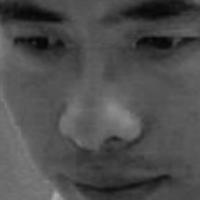最近要做一个人脸识别的东西,可数据库的人脸图像还没有做对齐处理。所以需要自己做人脸对齐预处理。网上查了,发现已经有人做过了类似的脚本。直接拿过来用了,原地址在这:https://github.com/bytefish/facerec/blob/master/py/apps/scripts/crop_face.py 自己为了以后更改,加了一些注释。
- # -*- coding: utf-8 -*-
- """
- Created on Thu Jan 1 16:09:32 2015
- @author: crw
- """
- # 参数含义:
- # CropFace(image, eye_left, eye_right, offset_pct, dest_sz)
- # eye_left is the position of the left eye
- # eye_right is the position of the right eye
- # 比例的含义为:要保留的图像靠近眼镜的百分比,
- # offset_pct is the percent of the image you want to keep next to the eyes (horizontal, vertical direction)
- # 最后保留的图像的大小。
- # dest_sz is the size of the output image
- #
- import sys,math,Image
- # 计算两个坐标的距离
- def Distance(p1,p2):
- dx = p2[0]- p1[0]
- dy = p2[1]- p1[1]
- return math.sqrt(dx*dx+dy*dy)
- # 根据参数,求仿射变换矩阵和变换后的图像。
- def ScaleRotateTranslate(image, angle, center =None, new_center =None, scale =None, resample=Image.BICUBIC):
- if (scale is None)and (center is None):
- return image.rotate(angle=angle, resample=resample)
- nx,ny = x,y = center
- sx=sy=1.0
- if new_center:
- (nx,ny) = new_center
- if scale:
- (sx,sy) = (scale, scale)
- cosine = math.cos(angle)
- sine = math.sin(angle)
- a = cosine/sx
- b = sine/sx
- c = x-nx*a-ny*b
- d =-sine/sy
- e = cosine/sy
- f = y-nx*d-ny*e
- return image.transform(image.size, Image.AFFINE, (a,b,c,d,e,f), resample=resample)
- # 根据所给的人脸图像,眼睛坐标位置,偏移比例,输出的大小,来进行裁剪。
- def CropFace(image, eye_left=(0,0), eye_right=(0,0), offset_pct=(0.2,0.2), dest_sz = (70,70)):
- # calculate offsets in original image 计算在原始图像上的偏移。
- offset_h = math.floor(float(offset_pct[0])*dest_sz[0])
- offset_v = math.floor(float(offset_pct[1])*dest_sz[1])
- # get the direction 计算眼睛的方向。
- eye_direction = (eye_right[0]- eye_left[0], eye_right[1]- eye_left[1])
- # calc rotation angle in radians 计算旋转的方向弧度。
- rotation =-math.atan2(float(eye_direction[1]),float(eye_direction[0]))
- # distance between them # 计算两眼之间的距离。
- dist = Distance(eye_left, eye_right)
- # calculate the reference eye-width 计算最后输出的图像两只眼睛之间的距离。
- reference = dest_sz[0]-2.0*offset_h
- # scale factor # 计算尺度因子。
- scale =float(dist)/float(reference)
- # rotate original around the left eye # 原图像绕着左眼的坐标旋转。
- image = ScaleRotateTranslate(image, center=eye_left, angle=rotation)
- # crop the rotated image # 剪切
- crop_xy = (eye_left[0]- scale*offset_h, eye_left[1]- scale*offset_v) # 起点
- crop_size = (dest_sz[0]*scale, dest_sz[1]*scale) # 大小
- image = image.crop((int(crop_xy[0]),int(crop_xy[1]),int(crop_xy[0]+crop_size[0]),int(crop_xy[1]+crop_size[1])))
- # resize it 重置大小
- image = image.resize(dest_sz, Image.ANTIALIAS)
- return image
- if __name__ =="__main__":
- image = Image.open("/media/crw/DataCenter/Dataset/CAS-PEAL-R1/POSE/000001/MY_000001_IEU+00_PD-22_EN_A0_D0_T0_BB_M0_R1_S0.tif")
- leftx =117
- lefty=287
- rightx=187
- righty= 288
- CropFace(image, eye_left=(leftx,lefty), eye_right=(rightx,righty), offset_pct=(0.1,0.1), dest_sz=(200,200)).save("test_10_10_200_200.jpg")
- CropFace(image, eye_left=(leftx,lefty), eye_right=(rightx,righty), offset_pct=(0.2,0.2), dest_sz=(200,200)).save("test_20_20_200_200.jpg")
- CropFace(image, eye_left=(leftx,lefty), eye_right=(rightx,righty), offset_pct=(0.3,0.3), dest_sz=(200,200)).save("test_30_30_200_200.jpg")
- CropFace(image, eye_left=(leftx,lefty), eye_right=(rightx,righty), offset_pct=(0.4,0.4), dest_sz=(200,200)).save("test_40_40_200_200.jpg")
- CropFace(image, eye_left=(leftx,lefty), eye_right=(rightx,righty), offset_pct=(0.45,0.45), dest_sz=(200,200)).save("test_45_45_200_200.jpg")
- CropFace(image, eye_left=(leftx,lefty), eye_right=(rightx,righty), offset_pct=(0.2,0.2)).save("test_20_20_70_70.jpg")
程序的结果:(图片采用Cas-Peal 数据库)


























 1万+
1万+

 被折叠的 条评论
为什么被折叠?
被折叠的 条评论
为什么被折叠?








